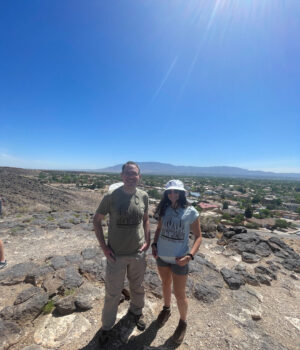When examining campus culture, we often focus on student activities. This semester we started a series examining how professors on campus contribute to our culture as well! This week we’re hearing from Dr. Chris Lassiter, a Professor of Biology.
Q: How did you come to work in your field?
A: I was fascinated by science as a child. I started my college degree on a PreMed track. As a first-generation college student, I thought if one enjoyed science, that medical school was the only career path to take. I didn’t realize all the careers in science that were available. I did research in genetics as an undergraduate and decided to go to graduate school in developmental biology and genetics. I have worked with zebrafish as a model system to understand human development for over 25 years now. These little fish share about 70% of their genes with humans so we can understand a lot about ourselves by studying how they build their bodies with all the organs in the right places.
Q: How long have you been at Roanoke, and how did you come to be here?
A: This is my 20th year at the college. I started in the Fall of 2005, fresh out of graduate school. After attending a small liberal arts college for my undergraduate education, I knew I wanted to be a professor at an institution like Roanoke College where teaching was the priority, but I could also have a research laboratory.
Q: What’s your favorite part of your work, and what’s the most challenging?
A: Teaching students in the classroom, in teaching labs, and in my research lab is the most rewarding part of my career. That joy is here at the college, seeing someone comprehend how a gene works or how an ecosystem functions, and it lasts for years as I watch my former students in successful careers. The most challenging part is the paperwork that happens with grading, advising, and serving on committees in the department and the college. While much of the paperwork is necessary, I’d rather be working with students in the research laboratory or office hours.
Q: What’s the biggest thing you’ve learned since coming to work here?
A: Take opportunities to serve, but don’t overcommit. I’ve had fantastic opportunities to serve students in a variety of ways I’d never imagined when I came to the college including a travel May Term to National Parks and serving as the college’s Director of Undergraduate Research. However, I’ve also learned to say no because taking on too many tasks at once decreases the quality of all of them.
Q: What’s your advice to Roanoke College students?
A: Get involved with the community of Roanoke College, not just other students but also the staff and the faculty. Learning works best when we engage our heads, our hands, and our hearts.
Maggie Raker
Section Editor




